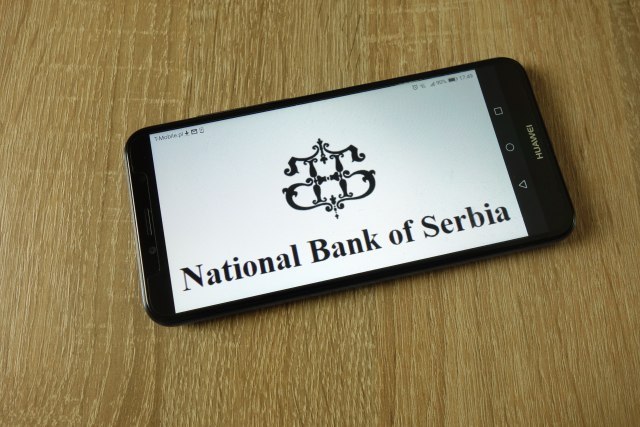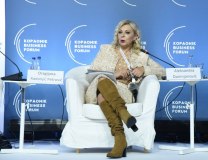Mali: 5.1 billion assigned to ecomony, 100 Euros aid to all adult citizens VIDEO
A full program of measures to help the Serbian economy affected by the effects of the coronavirus epidemic is worth 5.1 billion euros, Minister Sinisa Mali said
Source: Tanjug
|
"The program of economic measures to support the economy was supposed to be presented by President Aleksandar Vucic, but he is not feeling well today," Finance Minister Sinisa Mali said at the start of the presentation of a package of measures for the economy affected by the coronavirus pandemic.
"We have been working on this program for the past ten days, but we did not want to go out quickly with the program, we waited to see the consequences of the crisis as well as how other countries react and how their measures work," said Mali.
"The measures have two goals: preserving employment and other forms of assistance to the companies most affected by the crisis," the finance minister said.
"These measures are not the first to be adopted by the Government and the NBS (National Bank of Serbia). Two weeks ago, we introduced a decision to increase salaries for health care workers, as well as one-off assistance to pensioners", Mali said, adding that the NBS also made a decision on moratoriums on loans and financial leasing for 90 days.
"This crisis is not triggered in Serbia, this is a global crisis, which is faced by almost every country in the world. Serbia, in relation to a large number of countries, is waiting for this crisis and struggling with an economic crisis. We have stable public finances and we have sufficient funds. The biggest burden of the crisis will be borne by the state, so that the economy goes through with as few consequences as possible", Mali said.
He said that a few years ago, Serbia was on the verge of bankruptcy, but then Aleksandar Vucic initiated measures that allowed us to have money on our disposal today, to help the economy and help employees when that assistance is most needed.
The package of measures is worth 5.1 billion euros, which is, according to Mali, half of our annual budget, or 11 percent of GDP.
"The biggest demand of the private sector was to defer payment of taxes and contributions, which is what we did, we will help private employers to pay the minimum wage to their workers, so that we also satisfied their needs", Mali said.
The Minister of Finance said that entrepreneurs and workers of micro, small and medium-sized enterprises will be paid their first minimum wage in the middle of May. He added that the second and third minimum wages would then be paid in the next two months.
"We want to avoid the abuse that, when we pay it all at once, they get that money and then lay off the workers", Mali explained. He adds that this ensures continuity of payment and gives workers security to have means to live out of.
Asked if the money for small and medium-sized enterprises would be paid into the account of employees or companies, Mali said: "Both ways. That money goes to the employees of those companies, and how it will be paid, you will probably see through a special account that would then distribute that money to each employee from that company".
This package is a result of the tough measures we have implemented in recent years, saving and investing or repaying old debts, so we are approaching this package as we have enough resources to do so, while public debt will not exceed 60 GDP at any time, he said and added that this would shorten the time to get the economy back on track after the crisis. According to him, the government is determined that there is no reduction in salaries and layoffs in the public sector, as well as a reduction in pensions, and the government will strive to honor all obligations to Serbian business entities.
"This crisis will end one day, and with this package, we will help our economy to get back on its feet as soon as possible," Mali said.
He especially thanked President Vucic and pointed out that if he had not carried out the reforms in 2014, we would not have been able to provide this much assistance to the economy today.
"Stay home, protect the health of both yourself and your loved ones, and with this money and support, we will end up even stronger and better off," Mali concluded.
Cadez: The package keeps the backbone of the economy
President of the Serbian Chamber of Commerce, Marko Cadez, said the package responds to 90 percent of the proposal. "The economy is calling, businesses are calling, people are having problems, and this package is something that keeps the backbone of the economy," Cadez said. "You cannot solve this crisis by the billions you will pump into markets because markets do not exist right now, they must first return to function", Cadez concluded.
The Program of Economic Measures to reduce the negative effects caused by the Covid-19 virus pandemic and support to the Serbian economy includes the following measures:
- Postponement of payment of payroll taxes and contributions to the private sector, during a state of emergency, with a subsequent repayment of liabilities incurred in installments beginning at the earliest in 2021;
- delaying payment of income tax advance payments in the second quarter;
- exempting donors from the obligation to pay VAT.
It also envisages direct assistance to flat-rate entrepreneurs who pay taxes on real income, micro, small and medium-sized enterprises in the private sector - payment of aid at the minimum (during the state of emergency - three minimum wages), as well as direct assistance to private sector companies - payment of 50% of the net minimum wage (during a state of emergency) for employees who have been terminated by a decision (Articles 116 and 117 of the Labor Law)
Measures to preserve liquidity in the private sector are also included in the Program of financial support to the economy in the conditions of the crisis of the Development Fund of the Republic of Serbia; providing necessary guarantees to support the economy in the conditions of the Covid-19 crisis; a moratorium on dividend payments by the end of the year, except for Public Enterprises; fiscal stimulus - direct assistance to all adult citizens.
The overall estimated effect of the measures amounts to RSD 608.3 billion (EUR 5.178 billion).
Four sets of measures: Here where they are not applicable

Since the aim of the measures is to preserve employment during the state of emergency, as well as to assist economic entities that have difficulty in doing business during the state of emergency, the measures do not apply to economic entities that:
reduce the number of employees by more than 10 percent during a state of emergency (not counting part-time employees whose contract expires during a state of emergency);
temporarily ceased operations before the declaration of a state of emergency, that is, before 03/15/2020.
The first set of measures presupposes, for the most part, the postponement of payment of tax arrears, with subsequent repayment in installments, at the earliest since the beginning of 2021.
The deferral of taxes and earnings is deferred to ensure liquidity, sustain economic activity and employment. The payment of income tax advance payments in the second quarter is also postponed.
Postponement of payment of payroll taxes and contributions to the private sector, during a state of emergency, with a subsequent repayment of any liability incurred in installments beginning at the earliest from 2021. This measure is intended to increase the liquidity of all economic entities that pay salaries to employees. Also, this measure relates to deferring the payment of income tax on the self-employed activities of all entrepreneurs.
The increase in liquidity is reflected in the deferral of payment of tax expenses and contributions to earnings. All employers who choose to use this measure can apply deferral of tax and wage costs until the beginning of 2021, and thereafter leave the possibility of deferring these costs further for up to 24 months without the obligation to pay interest at the request of the taxpayer. The basic conditions for implementing this measure are identical for all employers, regardless of their economic strength.
Delaying the payment of income tax advances in the second quarter. The measure aims to increase taxpayers' liquidity by delaying the payment of income tax advance payments for 2020 due in the second quarter of 2020. The basic conditions for the application of this measure are identical for all tax payers regardless of their economic strength.
For the taxpayers to whom the measure applies, the basic conditions for implementation are identical regardless of the economic strength of the particular taxpayer.
Exemption of donors from the obligation to pay VAT. The main objective of this measure is to exempt those donors who donate their products, or products whose turnover they deal with, to institutions that are directly involved in activities aimed at preventing the spread and treatment of citizens from the disease COVID-19.
We believe that prescribing this measure is fully appropriate to the circumstances, and that the conditions for the application of this measure should be laid down in a manner that will prevent any abuse.
The second set of measures relates to direct payments to enterprises, payment of minimum wage support for entrepreneurs, micro, small and medium-sized enterprises, i.e. subsidies of 50% of the minimum wage to large enterprises whose employees are sent on forced leave due to reduced business volume or complete suspension of work.
Direct assistance to flat-rate entrepreneurs paying real income taxes to micro, small and medium-sized enterprises in the private sector - payment of minimum aid (during the state of emergency), and for large enterprises payment of 50% of the minimum employees whose contracts have been terminated by a decision (Articles 116 and 117 of the Labor Law).
This set of measures made a difference in the way it was applied based on the economic strength of the payer. Namely, it started from the assumption that companies that are classified as large companies have significantly greater economic power than entrepreneurs, micro, small and medium-sized legal entities. In accordance with the above, entrepreneurs, micro, small and medium-sized legal entities have been provided with economic assistance in the amount of net minimum wage for each person who has an employee status.
For legal entities classified as large, assistance was determined in proportion to the number of persons retained by these employers, although the need for such persons ceased to exist. Accordingly, this set of measures is aimed at the state effectively bearing part of the burden of payment of wages to persons for whom there has been a disruption, and which employers - large legal entities retain in employment.
With regard to the implementation of this measure, it should be especially taken into account that it does not enter into the business policy of taxpayers - large legal entities, nor does it limit the number of employees who determine termination of work (but not termination of employment), nor does it affect the extent of the rights exercised by employees during termination of employment. On the other hand, by the proposed measures, employers are sufficiently stimulated to maintain the existing level of employment, while in the case of entrepreneurs, small, micro and medium-sized legal entities, the greater scope of rights further enhances liquidity in order to maintain business, i.e. to abandon the initiation of termination proceedings.
The aim of the third set of measures is to preserve the liquidity of economic entities in the conditions of economic crisis expected during and after the end of the emergency caused by the COVID-19 virus pandemic. With this program, the Government of the Republic of Serbia wants to minimize external influences (decline in demand, interruption of supply chains, etc.) and their consequences (reduced employment, illiquidity, etc.) on the business of the Serbian economy.
In particular, the program provides for two measures:
1) a program for granting loans for maintaining liquidity and working capital for companies in the segment of entrepreneurs, micro, small and medium-sized economic entities, agricultural holdings and cooperatives that are registered in the relevant register through the Development Fund of the Republic of Serbia;
2) Providing necessary Guarantees for supporting the economy in the conditions of the COVID-19 crisis for loans for maintaining liquidity and working capital for companies in the segment of entrepreneurs, micro, small and medium-sized economic entities, as well as agricultural farms through commercial banks operating in the Republic of Serbia. The total value of the programs envisaged by this measure is RSD 264 billion (around EUR 2.2 billion).
The fourth set of measures relates to the payment of direct assistance in the amount of 100 euros in dinars equivalent to all adult citizens of the Republic of Serbia.
Measures adopted by the government and the measures that are underway
The prices and margins of basic foodstuffs, protective equipment, as well as the retail price of protective equipment are limited, in order to prevent market distortions and to enable the regular supply of basic essentials and protective equipment and supplies to the citizens. For the same reasons, the export of basic essential commodities (seeds, oil, yeast, soaps, detergents, disinfectants, alcohol, protective equipment) is temporarily prohibited.
Furthermore, in order to protect the population, it was decided that all personal documents of citizens of the Republic of Serbia who had already expired or should expire soon should be considered valid for the duration of the Decision on Declaration of Emergency. The time limits in administrative proceedings are harmonized in such a way that the parties cannot bear the consequences of non-compliance with the deadlines due to the state of emergency, while in court proceedings, the deadlines cease to run during the state of emergency, and the continuation of the calculation of time limits is related to the termination of the state of emergency.
In order to protect employees and employed persons, a number of measures have been taken that oblige the employer to enable telework, work from home, work in smaller shifts, in order to protect employed persons.
Taxpayers who have an approved deferred tax payment during the state of emergency will not be subject to cancellation of the agreement and the collection of unpaid tax debt (from collateral and in enforced collection), beginning with the March 2020 installment.
Due to the declaration of a state of emergency in the Republic of Serbia, the deadlines are being postponed for the preparation and submission of annual financial reports of direct beneficiaries of the budget funds of the Republic of Serbia, budgets of autonomous provinces and local self-government units, final accounts of the RS budget, autonomous provinces, budgets of local self-government units and organizations for binding social security, as well as the consolidated report of the Republic of Serbia and the consolidated reports of cities for 2019.
Interim Measures of the National Bank of Serbia (NBS)

The National Bank of Serbia has adopted provisional measures in order to preserve the financial system, namely:
Delay in repayment (moratorium) to debtors on repayment of loans, as well as financial leasing obligations, not less than 90 days, or from the duration of a state of emergency, during which time the bank does not calculate default interest on arrears and does not initiate execution procedure, as well as the procedure of enforced collection of debts, that is, does not take other legal actions in order to collect claims against the debtors. The debtors will not pay any reimbursement for the use of this opportunity, and such loans will not be considered as restructured or problematic claims.
During a state of emergency, the leasing provider does not calculate the default interest on the outstanding claim and does not initiate the enforcement procedure, as well as the compulsory collection procedure against the lessee, or undertake other legal actions to collect the receivable from the lessee.
In addition, in accordance with the Payment Remuneration Decision, fees and other costs for the payment and transfer of funds to receive donations to combat the epidemic of COVID-19 cannot be charged for. This Decision applies to banks, electronic money institutions, payment institutions and the public postal operator, as well as the National Bank of Serbia for the payment and transfer of funds to receive donations in the fight against the COVID-19 pandemic.











